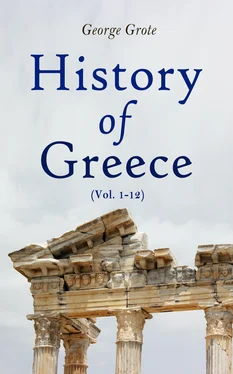George Grote - History of Greece (Vol. 1-12)
Здесь есть возможность читать онлайн «George Grote - History of Greece (Vol. 1-12)» — ознакомительный отрывок электронной книги совершенно бесплатно, а после прочтения отрывка купить полную версию. В некоторых случаях можно слушать аудио, скачать через торрент в формате fb2 и присутствует краткое содержание. Жанр: unrecognised, на английском языке. Описание произведения, (предисловие) а так же отзывы посетителей доступны на портале библиотеки ЛибКат.
- Название:History of Greece (Vol. 1-12)
- Автор:
- Жанр:
- Год:неизвестен
- ISBN:нет данных
- Рейтинг книги:5 / 5. Голосов: 1
-
Избранное:Добавить в избранное
- Отзывы:
-
Ваша оценка:
- 100
- 1
- 2
- 3
- 4
- 5
History of Greece (Vol. 1-12): краткое содержание, описание и аннотация
Предлагаем к чтению аннотацию, описание, краткое содержание или предисловие (зависит от того, что написал сам автор книги «History of Greece (Vol. 1-12)»). Если вы не нашли необходимую информацию о книге — напишите в комментариях, мы постараемся отыскать её.
History of Greece (Vol. 1-12) — читать онлайн ознакомительный отрывок
Ниже представлен текст книги, разбитый по страницам. Система сохранения места последней прочитанной страницы, позволяет с удобством читать онлайн бесплатно книгу «History of Greece (Vol. 1-12)», без необходимости каждый раз заново искать на чём Вы остановились. Поставьте закладку, и сможете в любой момент перейти на страницу, на которой закончили чтение.
Интервал:
Закладка:
With these few prefatory remarks, I proceed to notice the most conspicuous of the Grecian heroic pedigrees, and first, that of Argos.
The earliest name in Argeian antiquity is that of Inachus, the son of Oceanus and Têthys, who gave his name to the river flowing under the walls of the town. According to the chronological computations of those who regarded the mythical genealogies as substantive history, and who allotted a given number of years to each generation, the reign of Inachus was placed 1986 B. C., or about 1100 years prior to the commencement of the recorded Olympiads. 181
The sons of Inachus were Phorôneus and Ægialeus; both of whom however were sometimes represented as autochthonous men, the one in the territory of Argos, the other in that of Sikyôn. Ægialeus gave his name to the north-western region of the Peloponnêsus, on the southern coast of the Corinthian Gulf. 182The name of Phorôneus was of great celebrity in the Argeian mythical genealogies, and furnished both the title and the subject of the ancient poem called Phorônis, in which he is styled “the father of mortal men.” 183He is said to have imparted to mankind, who had before him lived altogether isolated, the first notion and habits of social existence, and even the first knowledge of fire: his dominion extended over the whole Peloponnêsus. His tomb at Argos, and seemingly also the place called the Phorônic city, in which he formed the first settlement of mankind, were still shown in the days of Pausanias. 184The offspring of Phorôneus, by the nymph Teledikê, were Apis and Niobê. Apis, a harsh ruler, was put to death by Thelxiôn and Telchin, having given to Peloponnêsus the name of Apia: 185he was succeeded by Argos, the son of his sister Niobê by the god Zeus. From this sovereign Peloponnêsus was denominated Argos. By his wife Evadnê, daughter of Strymôn, 186he had four sons, Ekbasus, Peiras, Epidaurus, and Kriasus. Ekbasus was succeeded by his son Agênôr, and he again by his son Argos Panoptês,—a very powerful prince who is said to have had eyes distributed over all his body, and to have liberated Peloponnêsus from several monsters and wild animals which infested it: 187Akusilaus and Æschylus make this Argos an earth-born person, while Pherekydês reports him as son of Arestôr. Iasus was the son of Argos Panoptês by Ismênê, daughter of Asôpus. According to the authors whom Apollodôrus and Pausanias prefer, the celebrated Iô was his daughter: but the Hesiodic epic (as well as Akusilaus) represented her as daughter of Peiras, while Æschylus and Kastor the chronologist affirmed the primitive king Inachus to have been her father. 188A favorite theme, as well for the ancient genealogical poets as for the Attic tragedians, were the adventures of Iô, of whom, while priestess of Hêrê, at the ancient and renowned Hêræon between Mykênæ and Argos, Zeus became amorous. When Hêrê discovered the intrigue and taxed him with it, he denied the charge, and metamorphosed Iô into a white cow. Hêrê, requiring that the cow should be surrendered to her, placed her under the keeping of Argos Panoptês; but this guardian was slain by Hermês, at the command of Zeus: and Hêrê then drove the cow Iô away from her native land by means of the incessant stinging of a gad-fly, which compelled her to wander without repose or sustenance over an immeasurable extent of foreign regions. The wandering Iô gave her name to the Ionian Gulf, traversed Epirus and Illyria, passed the chain of Mount Hæmus and the lofty summits of Caucasus, and swam across the Thracian or Cimmerian Bosporus (which also from her derived its appellation) into Asia. She then went through Scythia, Cimmeria, and many Asiatic regions, until she arrived in Egypt, where Zeus at length bestowed upon her rest, restored her to her original form, and enabled her to give birth to his black son Epaphos. 189
Such is a general sketch of the adventures which the ancient poets, epic, lyric, and tragic, and the logographers after them, connect with the name of the Argeian Iô,—one of the numerous tales which the fancy of the Greeks deduced from the amorous dispositions of Zeus and the jealousy of Hêrê. That the scene should be laid in the Argeian territory appears natural, when we recollect that both Argos and Mykênæ were under the special guardianship of Hêrê, and that the Hêræon between the two was one of the oldest and most celebrated temples in which she was worshipped. It is useful to compare this amusing fiction with the representation reported to us by Herodotus, and derived by him as well from Phœnician as from Persian antiquarians, of the circumstances which occasioned the transit of Iô from Argos to Egypt,—an event recognized by all of them as historical matter of fact. According to the Persians, a Phœnician vessel had arrived at the port near Argos, freighted with goods intended for sale to the inhabitants of the country. After the vessel had remained a few days, and disposed of most of her cargo, several Argeian women, and among them Iô the king’s daughter, coming on board to purchase, were seized and carried off by the crew, who sold Iô in Egypt. 190The Phœnician antiquarians, however, while they admitted the circumstance that Iô had left her own country in one of their vessels, gave a different color to the whole by affirming that she emigrated voluntarily, having been engaged in an amour with the captain of the vessel, and fearing that her parents might come to the knowledge of her pregnancy. Both Persians and Phœnicians described the abduction of Iô as the first of a series of similar acts between Greeks and Asiatics, committed each in revenge for the preceding. First came the rape of Eurôpê from Phœnicia by Grecian adventurers,—perhaps, as Herodotus supposed, by Krêtans: next, the abduction of Mêdeia from Kolchis by Jasôn, which occasioned the retaliatory act of Paris, when he stole away Helena from Menelaos. Up to this point the seizures of women by Greeks from Asiatics, and by Asiatics from Greeks, had been equivalents both in number and in wrong. But the Greeks now thought fit to equip a vast conjoint expedition to recover Helen, in the course of which they took and sacked Troy. The invasions of Greece by Darius and Xerxes were intended, according to the Persian antiquarians, as a long-delayed retribution for the injury inflicted on the Asiatics by Agamemnôn and his followers. 191
The account thus given of the adventures of Iô, when contrasted with the genuine legend, is interesting, as it tends to illustrate the phænomenon which early Grecian history is constantly presenting to us,—the way in which the epical furniture of an unknown past is recast and newly colored so as to meet those changes which take place in the retrospective feelings of the present. The religious and poetical character of the old legend disappears: nothing remains except the names of persons and places, and the voyage from Argos to Egypt: we have in exchange a sober, quasi-historical narrative, the value of which consists in its bearing on the grand contemporary conflicts between Persia and Greece, which filled the imagination of Herodotus and his readers.
To proceed with the genealogy of the kings of Argos, Iasus was succeeded by Krotôpus, son of his brother Agênôr; Krotôpus by Sthenelas, and he again by Gelanôr. 192In the reign of the latter, Danaos came with his fifty daughters from Egypt to Argos; and here we find another of those romantic adventures which so agreeably decorate the barrenness of the mythical genealogies. Danaos and Ægyptos were two brothers descending from Epaphos, son of Iô: Ægyptos had fifty sons, who were eager to marry the fifty daughters of Danaos, in spite of the strongest repugnance of the latter. To escape such a necessity, Danaos placed his fifty daughters on board of a penteconter (or vessel with fifty oars) and sought refuge at Argos; touching in his voyage at the island of Rhodes, where he erected a statue of Athênê at Lindos, which was long exhibited as a memorial of his passage. Ægyptos and his sons followed them to Argos and still pressed their suit, to which Danaos found himself compelled to assent; but on the wedding night he furnished each of his daughters with a dagger, and enjoined them to murder their husbands during the hour of sleep. His orders were obeyed by all, with the single exception of Hypermnêstra, who preserved her husband Lynkeus, incurring displeasure and punishment from her father. He afterwards, however, pardoned her; and when, by the voluntary abdication of Gelanôr, he became king of Argos, Lynkeus was recognized as his son-in-law and ultimately succeeded him. The remaining daughters, having been purified by Athênê and Hermês, were given in marriage to the victors in a gymnic contest publicly proclaimed. From Danaos was derived the name of Danai, applied to the inhabitants of the Argeian territory, 193and to the Homeric Greeks generally.
Читать дальшеИнтервал:
Закладка:
Похожие книги на «History of Greece (Vol. 1-12)»
Представляем Вашему вниманию похожие книги на «History of Greece (Vol. 1-12)» списком для выбора. Мы отобрали схожую по названию и смыслу литературу в надежде предоставить читателям больше вариантов отыскать новые, интересные, ещё непрочитанные произведения.
Обсуждение, отзывы о книге «History of Greece (Vol. 1-12)» и просто собственные мнения читателей. Оставьте ваши комментарии, напишите, что Вы думаете о произведении, его смысле или главных героях. Укажите что конкретно понравилось, а что нет, и почему Вы так считаете.












